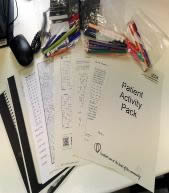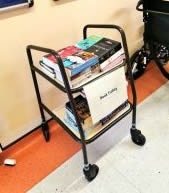COVID-19 - A Reflection
By Steffi Bailey - Physiotherapy and Occupational Therapy Clinical Lead
Leslie Smith Ward, Bognor Regis War Memorial Hospital
Sussex Community NHS Foundation Trust
As restrictions on all of our lives started to come into effect in late March due to COVID-19, it was evident that life on our Intermediate Care Units was also going to change significantly. Nearly all of the activities our patients and staff normally took for granted stopped overnight, and as a result we quickly realised we would have to increase our focus on supporting patients with their social and psychological wellbeing, in part due to the anxiety around the virus, but also because the restrictions were bound to have a big impact on patients' physical and mental health.
There were to be no exercise groups, no communal dining, no watching television in the dayroom, no visits out to the chapel garden, no visits from family and friends, no volunteers, no therapy dog visits, no hairdressers, and no chaplain to visit. Patients were not able to wear their own clothes, and at times they couldn't even leave their rooms to access communal bathrooms. I'm sure that staff also felt less approachable to our patients in their face masks, face shields and all the other forms of PPE we have had to endure. From a staff perspective it felt like everything we valued about the quality of care and rehabilitation our service normally offered just stopped. For the patients I am sure it was terrifying, a feeling echoed by staff at times too.
Now being able to reflect on this time of huge change to both our personal and working lives, I feel proud of how the team implemented ideas to make this awful time more positive for the patients. It is also worth noting here that lots of the staff involved were redeployed from other teams, but got stuck in and implemented ideas throughout.


The therapists started a 'wellbeing hour' between 11 and 12 o'clock daily. In each bay staff would go in and carry out 30-40 minutes of group exercise, then for the last 20 minutes they would have been a quiz, or a word wheel put up on a flip chart. We also printed colouring and word search pages for patients. When we asked for donations of colouring pencils on Facebook we received so many that we were able to make up over 100 packs of pencils that patients could have to keep. The wellbeing hour also helped to ensure patients in the side rooms received some 1:1 time with a staff member, recognising that this was the only contact they would have.
We went to the shops to buy newspapers for patients at their request to ensure they felt up to date with the ever changing news scene each day. We also asked for donations of books and magazines, which meant we could set up book trolleys to take around the wards with a huge variety of genres. Sage House Dementia Support gifted us lots of activity books, and SCFT volunteers kindly put together patient activity packs. Families of staff members donated wool and knitting needles, and playing cards and tissues; all brilliant ideas that we used to help improve the health of the patients.


Although it has been a tough few months for everyone, it's been heart-warming to see how staff from different teams can work so positively in such a challenging environment, and also that volunteers and members of the public have supported the efforts of our NHS staff throughout. I feel that the focus we put into making the best out of a bad situation helped build morale and resilience throughout the team, so thank you to all involved."